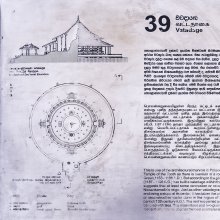Avama, Avāma: 12 definitions
Introduction:
Avama means something in Hinduism, Sanskrit, Hindi. If you want to know the exact meaning, history, etymology or English translation of this term then check out the descriptions on this page. Add your comment or reference to a book if you want to contribute to this summary article.
Images (photo gallery)
In Hinduism
Jyotisha (astronomy and astrology)
Source: Wisdom Library: Brihat Samhita by VarahamihiraAvama (अवम) refers to “intercalary days”, according to the Bṛhatsaṃhitā (chapter 2), an encyclopedic Sanskrit work written by Varāhamihira mainly focusing on the science of ancient Indian astronomy astronomy (Jyotiṣa).—Accordingly, “We shall now proceed to give a brief description of (the qualifications of) a jyotiṣaka. [...] He must have a clear knowledge of the causes of Solar, Savana, Siderial and Lunar months as well as of intercalary lunations and intercalary days [i.e., avama]. He must have a knowledge of the beginning and end of Śaṣṭyābda (a cycle of 60 years) [Ṣaṣṭyabda?], a Yuga (5 years), Varṣa (a year), Māsa (a month), Thina (a day) and Horā (an hour) and of their lords”.

Jyotisha (ज्योतिष, jyotiṣa or jyotish) refers to ‘astronomy’ or “Vedic astrology” and represents the fifth of the six Vedangas (additional sciences to be studied along with the Vedas). Jyotisha concerns itself with the study and prediction of the movements of celestial bodies, in order to calculate the auspicious time for rituals and ceremonies.
Languages of India and abroad
Sanskrit dictionary
Source: DDSA: The practical Sanskrit-English dictionaryAvama (अवम).—a. [av-amac Uṇādi-sūtra 5.54.]
1) Sinful, wicked.
2) Contemptible, mean, undermost, lowest.
3) Base, low, inferior (opp. parama); अनलकानलकानवमां पुरीम् (analakānalakānavamāṃ purīm) R.9.14; see अनवम (anavama); या त उक्तिरवमा या परमा (yā ta uktiravamā yā paramā) Ṛgveda 6.25.1.
4) Next, intimate.
5) Last, youngest; उतावमस्य पुरुहूत बोधि (utāvamasya puruhūta bodhi) Ṛgveda 6. 21.5. प्रद्युम्न इति विख्यातः सर्वतोऽनवमः पितुः (pradyumna iti vikhyātaḥ sarvato'navamaḥ pituḥ) Bhāgavata 1.55.2.
6) decreasing.
-maḥ 1 A protector.
2) A class of Manes; त्रिविधाः पितरः अवमा ऊर्वाः काव्याश्च (trividhāḥ pitaraḥ avamā ūrvāḥ kāvyāśca).
-mam 1 Sin.
2) A lunar day exactly coinciding with a solar one; the difference between a Chāndra (29 days, 31 Ghaṭikās and 5 palas) and a solar month (3 days); तिथ्यन्तद्वयमेको दिनवारः स्पृशति यत्र तद्भवत्यवमदिनम् (tithyantadvayameko dinavāraḥ spṛśati yatra tadbhavatyavamadinam) Jyotiṣa.
--- OR ---
Avāma (अवाम).—a.
1) Not left, right.
2) Favourable, not adverse.
3) Inauspicious, inelegant.
Source: Cologne Digital Sanskrit Dictionaries: Shabda-Sagara Sanskrit-English DictionaryAvama (अवम).—mfn.
(-maḥ-mā-maṃ) Low, vile, inferior, base. n.
(-naṃ) A lunar day, exactly coinciding with a solar one. E. ava to preserve, &c. ama Unadi aff.
Source: Cologne Digital Sanskrit Dictionaries: Benfey Sanskrit-English DictionaryAvama (अवम).—[ava + ma], adj., f., mā, Low.
Source: Cologne Digital Sanskrit Dictionaries: Cappeller Sanskrit-English DictionaryAvama (अवम).—[adjective] lowest, vilest; nearest, next; latest last.
Source: Cologne Digital Sanskrit Dictionaries: Monier-Williams Sanskrit-English Dictionary1) Avama (अवम):—mf(ā)n. undermost, inferior, lowest base, [Ṛg-veda] etc.
2) next, intimate, [Ṛg-veda]
3) last, youngest, [Ṛg-veda vi, 21, 5], (ifc. with numerals) less by, [Ṛgveda-prātiśākhya]
4) n. ([scilicet] dina) or (āni) [plural] the difference (expressed in days of twenty-four hours) existing between the lunar months and the corresponding solar ones, [Varāha-mihira’s Bṛhat-saṃhitā etc.]
5) Avamā (अवमा):—[=ava-√mā] ([indeclinable participle] -māya) to measure off, [Taittirīya-saṃhitā]
Source: Cologne Digital Sanskrit Dictionaries: Yates Sanskrit-English DictionaryAvama (अवम):—[(maḥ-mā-maṃ) a.] Low. n. Lunar days.
Source: DDSA: Paia-sadda-mahannavo; a comprehensive Prakrit Hindi dictionary (S)Avama (अवम) in the Sanskrit language is related to the Prakrit words: Oma, Omiṇa.
[Sanskrit to German]
Sanskrit, also spelled संस्कृतम् (saṃskṛtam), is an ancient language of India commonly seen as the grandmother of the Indo-European language family (even English!). Closely allied with Prakrit and Pali, Sanskrit is more exhaustive in both grammar and terms and has the most extensive collection of literature in the world, greatly surpassing its sister-languages Greek and Latin.
Hindi dictionary
Source: DDSA: A practical Hindi-English dictionaryAvāma (अवाम) [Also spelled avam]:—(nm) the people, common man.
...
Kannada-English dictionary
Source: Alar: Kannada-English corpusAvama (ಅವಮ):—
1) [adjective] of low quality, status, rank, etc.; inferior.
2) [adjective] morally base or evil; wicked; depraved; vile.
--- OR ---
Avama (ಅವಮ):—[noun] = ಅವಮೆ [avame].
--- OR ---
Avāma (ಅವಾಮ):—
1) [adjective] that is not left; right.
2) [adjective] moving clockwise.
3) [adjective] not deviating from the straight or correct path (fig. also).
Kannada is a Dravidian language (as opposed to the Indo-European language family) mainly spoken in the southwestern region of India.
See also (Relevant definitions)
Starts with (+74): Avamaccu, Avamadda, Avamaddaga, Avamadina, Avamagga, Avamagga, Avamajj, Avamajja, Avamajjana, Avamajjayana, Avamakam, Avamakku, Avamalika, Avamalina, Avaman, Avamana, Avamanalabdheshu, Avamanam, Avamanamadu, Avamanana.
Ends with: Ajmodavama, Akshavama, Anavama, Ekavama, Godavama, Hastavama, Karjavama, Kavama, Mavama, Navama, Pratishiddhavama, Varitavama, Yajnavama.
Full-text (+8): Oma, Anavama, Omasati, Nyunaha, Anavamadarshin, Omina, Avamana, Arama, Omaraka, Avamatankusha, Ekavama, Tithikshaya, Avamatippu, Avam, Avamashesha, Avamakam, Apama, Orima, Ava, Thina.
Relevant text
Search found 1 books and stories containing Avama, Ava-ma, Ava-mā, Avāma, Avamā; (plurals include: Avamas, mas, mās, Avāmas, Avamās). You can also click to the full overview containing English textual excerpts. Below are direct links for the most relevant articles:
Rig Veda (translation and commentary) (by H. H. Wilson)

